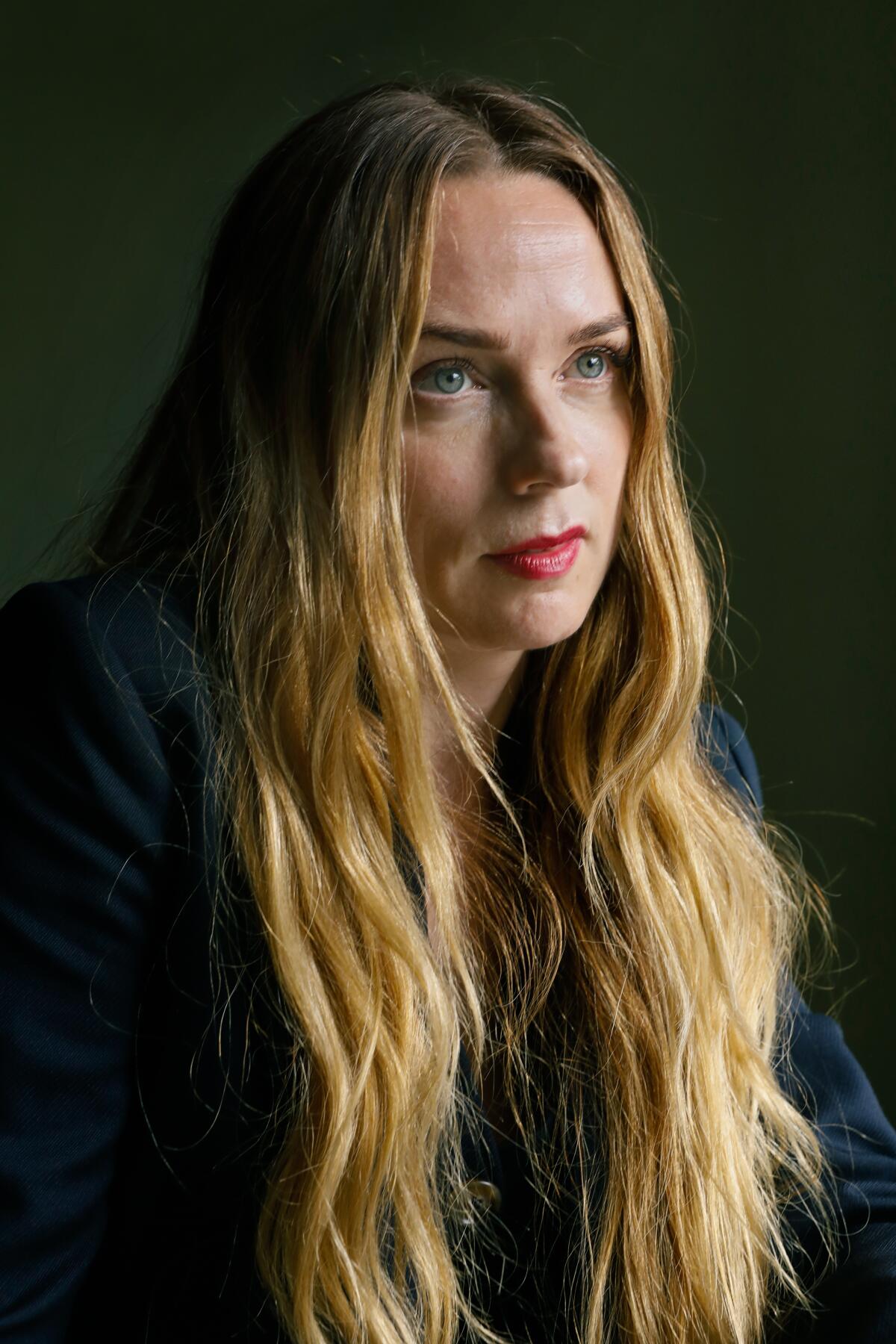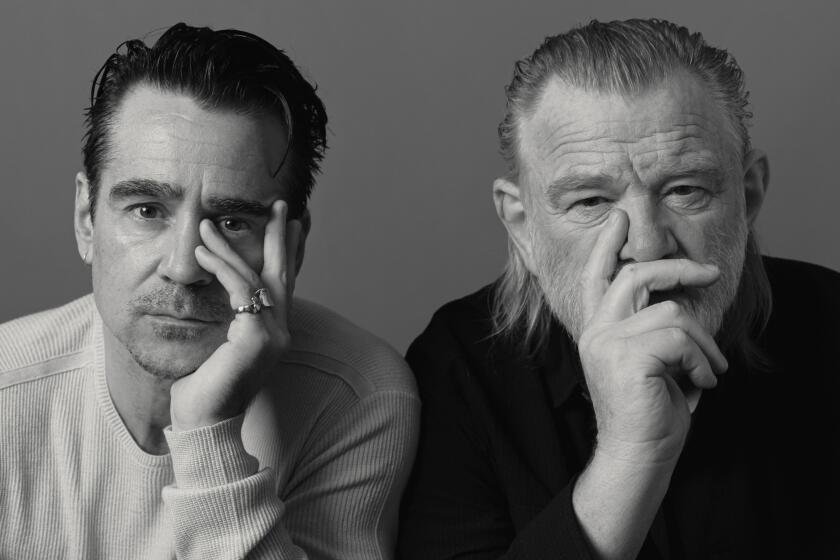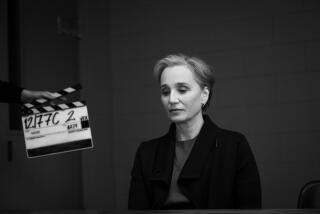Why Kerry Condon connected with the sadness and desire to leave in her ‘Banshees’ role

Growing up in County Tipperary, Ireland, Kerry Condon spent so much time planning her escape that her father gave her the nickname “Fledgy-poo.” “Like a fledgling who just wanted to leave the nest,” says Condon, who by age 10 was dashing off letters to showbiz heavyweights like former CAA chairman Mike Ovitz. “I totally thought I was a brilliant actress. And everyone needed to know that globally. I think I was kind of demented.”
The legendary agent may not have replied, but Fledgy-poo was onto something. She landed a role in “Angela’s Ashes” at 16, and two years later appeared in Martin McDonagh’s play “The Lieutenant of Inishmore.” In 2006, she became the youngest actor cast as Ophelia in the Royal Shakespeare Company’s “Hamlet.” Since then, there’s been no stopping her.
In McDonagh’s latest film, “The Banshees of Inisherin,” much has been made of the fact that it reunites Colin Farrell with Brendan Gleeson 14 years after their noticeable chemistry as guilt-stricken hit men in McDonagh’s directorial feature debut, “In Bruges.” But just and equal attention has been given to Condon’s affecting turn as Siobhan, sister to Farrell’s easygoing Pádraic, and the smartest, most soulful and possibly only rational individual on the remote island off the coast of Ireland.
You’ve been in at least three of Martin McDonagh’s plays. In fact, he wrote Siobhan with you in mind. What about her felt very familiar?
I’m very bookish. I think also the sadness of Siobhan — he knew I tend to get sad easily. I think about the sadness of things more than the happiness. I’m always envious of people who laugh at everything, smiling all the time. I always think, “Jaysus, I don’t think I’ve ever been that happy.”
Initially, you weren’t that taken with Siobhan. What changed?
The other [characters of McDonagh’s I’ve played] were so much fun. They’re firecrackers, with great lines and that childlike confidence, not holding back at all. Siobhan keeps things private. I felt like there was a grief she was carrying. That turned out to be harder to play. I had to play it like she had all this weight to her, yet she also had to be kind of hopeful.
Is there a difference in making the humor land in a McDonagh film versus one of his plays?
There’s a timing to it. When we’d rehearse the plays, you have a feeling [when a line] is going to get a laugh. So you pause or be ready to pause so you can have the laugh, then come in with the line. I remember saying to him [with “Banshees”], “But what if they’re laughing while I’m saying my line?” And Martin said, “Then they’ll just have to watch the movie twice.” [Laughs]
From ‘In Bruges’ to ‘Saturday Night Live,’ the ‘Banshees of Inisherin’ co-stars have never had a problem picking up where they left off.
You and Colin Farrell are quite convincing as siblings. Was that luck or strategy?
Colin’s very close with his sister, and I’m very close with my brother. I kind of revert to the person I was when we were growing up. We just joke with each other, make each other laugh. But I also had to think about how when you’re with your brother there’s nothing sexual — and you have to really think about that if you’re in a room with Colin Farrell. [Laughs] I can’t be concerned about my appearance or how I look when I say a particular line.
There was no element of trying to look attractive. I took away all those things. Because when you’re with your siblings, you’re just uber-comfortable with everything.
Comfortable enough that Siobhan and Pádraic sleep in the same tiny bedroom together.
I guess, ya know, that’s just what they did as children. And I think that added to Siobhan thinking, “I’m stuck here.” I wondered if she read books with romances in them. Like, “There’s so much more to my life.” She was trapped in the past in the house.
Talk about Pádraic’s sidekick, the scene-stealing miniature donkey, Jenny.
She was just a young little animal. There was only so much her attention span would do. We set it up in a way where we’d do a lot of our stuff first. Then at the last bit, bring in Jenny. She’d be unpredictable at times. You’d just have to go with it.
An example of a donkey improv, please.
In that scene where I come in and [Jenny is inside the house] and I go, “For God’s sake, Pádraic!” Jenny was supposed to stay sitting down, but she just gets up and walks out of the room. But we decided that’s the scene: Jenny decides, “I’m out of here.” It’s almost like with children: You have to be ready for anything, patient, very gentle. Calm.
Wasn’t there a screen double donkey named Rosie?
Yes. Rosie was also her close friend. When Jenny was in the house, Rosie was too, but off camera. If she couldn’t see Rosie, she’d get upset. I was fond of Rosie. I felt like she was the understudy who didn’t get the praise. So I’d rub her a little bit more than I’d rub Jenny. I didn’t want Rosie to feel like she wasn’t special.
More to Read
From the Oscars to the Emmys.
Get the Envelope newsletter for exclusive awards season coverage, behind-the-scenes stories from the Envelope podcast and columnist Glenn Whipp’s must-read analysis.
You may occasionally receive promotional content from the Los Angeles Times.











